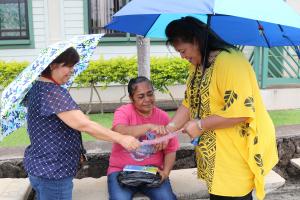Community health worker training expansion aids underserved communities
Kapiʻolani Community CollegeMarketing Coordinator, Kapiʻolani Community College
Brandon Higa, (808) 734-9776
Kapiʻolani Community College Grants Office

CHWP supports students statewide with a focus on recruitment from communities that are often underre
A $1.29 million grant will address health disparities for people living in economically and medically under-resourced communities in the State of Hawaiʻi through a project called Kapi‘olani Community College's Community Health Worker Training Program (CHWTP): Removing Barriers to Care in Urban Polynesia.
It’s part of $11.3 million the University of Hawaiʻi is receiving from the U.S. Department of Health and Human Services to support programs and research that aim to reduce racial and ethnic disparities and boost Hawaiʻi’s health care workforce.
The Kapi‘olani CC project, funded by Health Resources & Services Administration’s Community Health Worker Training Program of President Joe Biden’s American Rescue Plan Act, will expand training to new community health workers (CHWs), extend existing CHW skills through Emergency Medical Technician training, and deploy CHWs to address areas of higher social vulnerability to improve health equity.
“Kapiʻolani’s Community Health Worker Training Program serves as a bridge between the formal health system and vulnerable communities in the State of Hawaiʻi. This federal grant provides the resources Kapi‘olani needs to leverage our health academic program's expertise and expand its reach into the communities we serve,” said Principal Investigator Maria Bautista, interim vice chancellor for academic affairs. “We honor Queen Kapiʻolani's vision to provide education and access to proper quality health care to Hawaiʻi's most vulnerable communities through this project."
Statewide CHW training
The Kapiʻolani Community College Health Worker Training Program is a 16-credit training program with an ongoing statewide recruitment from local communities. Since 2019, more than 50% of students were from environmentally, economically, and/or educationally disadvantaged communities including 100% of students (33 of 33) enrolled from 2019–20, and 73% of students (112 of 153) enrolled from 2020–21. The expansion of the program from 2020 and beyond came through the Hawaiʻi State Department of Health-UH Contact Tracing Training Program, part of the UHealthy Hawaii Initiative, whose staff and programs were leveraged as a foundation for this grant.
“Cohorts for this program will come from residents of environmentally, economically or educationally disadvantaged communities and will include Native Hawaiian, Chuukese and Marshallese students, first generation college students, housing project residents and student from the highest areas of social vulnerability in Lānaʻi, Maui, Kauaʻi and Hawaiʻi Island,” said Joey Dewater, Kapiʻolani CC Community Health Worker Program coordinator.
The program aims to prepare 30 participants annually and includes an apprenticeship with employers that leads to long-term employment.
On Oʻahu, CHW participants will complete the Certificate of Competence training in-person and through external partnerships with Waiʻanae Coast Comprehensive Health Center and Kōkua Kalihi Valley. The areas of Waiʻanae and Kalihi Valley rank among the highest for social vulnerability in the state with large populations of Native Hawaiians, Chuukese and Marshallese residents in public housing projects.
Participants from the islands of Lānaʻi, Maui, Hawaiʻi and Kauaʻi will complete their training online. The neighbor islands face unique challenges recruiting healthcare professionals and reaching remote communities ranking the highest in social vulnerability.
Emergency Medical Technician training
In addition to the expansion of CHW training, the program will aim to extend the skills of 10 practicing CHWs with a full-time 19.6-credit Emergency Medical Technician (EMT) training to obtain an EMT state license. After completing the courses, students will be placed on ambulances in their local areas to complete 350 hours of paid clinical training, with a goal of full-time employment as a CHW-EMT. CHW-EMTs will be hired on ambulances in order to reduce the number of preventable 911 calls and transports, delivering CHW services to common 911 utilizers: kūpuna (elders), unsheltered community members and those in a mental health crisis.
"We worked with our community partners to come up with a program to train community members in place, and respond to a shortage of CHWs and community paramedicine trained EMTs,” said Dewater. “This program was created directly from their feedback. We are very proud of the program we've put together and are excited to get to work."
The Kapiʻolani Community College Health Worker Training Program will begin its next statewide course series in January 2023. For more information and to apply please contact Recruitment Facilitator Hilary Hacker, hackerh@hawaii.edu.

